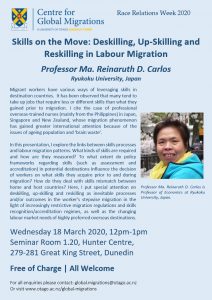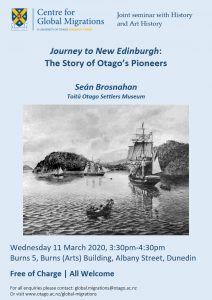Workshop on overseas educated nurses in New Zealand
EVENT POSTPONED
Workshop
‘For whose care? A Multidisciplinary Workshop on Overseas Educated Nurses in New Zealand’s Elderly Care Sector’
Wednesday 25 March 2020, 12-1pm
Room 1.21, Hunter Centre, 279-281 Great King Street, Dunedin
In New Zealand, one of the more popular pathways for overseas educated nurses to gain qualifications in New Zealand is to initially work in elderly care homes as care workers. While they help supplement the care workforce, there remains concerns about retaining those nurses with appropriate qualifications and competencies required by the New Zealand health system, especially in view of changes in public policy in health, education and migration.
The tasks of this workshop are two-fold: first, we examine and weigh the advantages and disadvantages of employing and retaining overseas-educated nurses with qualifications either or in both the home country and New Zealand, from the perspectives of both the nurses themselves and the elderly care homes, and against the background of the existing and changing public policies. Second, we attempt to explore strategies that would enable elderly care homes to meet its long-term needs for care workers, perhaps through encouraging foreign-educated, New Zealand-qualified nurses to stay (retention incentives and policies), and by adopting alternative recruitment schemes attracting the wider migrant worker population.
Through these exercises, we hope to provide some policy suggestions for both New Zealand and Japan in terms of how to sustain the intensifying demand for skilled care workforce by tapping the various categories of the migrant population and providing effective job retention incentives.
Public Lecture: Skills on the Move
EVENT POSTPONED
Free Public Lecture
Skills on the Move: Deskilling, Up-skilling and Reskilling in Labour Migration
Professor Ma. Reinaruth D. Carlos
Ryukoku University, Japan
Wednesday 18 March 2020, 12pm-1pm
Room 1.20, Hunter Centre, 279-281 Great King Street, Dunedin
Migrant workers have various ways of leveraging skills in destination countries. It has been observed that many tend to take up jobs that require less or different skills than what they gained prior to migration. I cite the case of professional overseas-trained nurses (mainly from the Philippines) in Japan, Singapore and New Zealand, whose migration phenomenon has gained greater international attention because of the issues of ageing population and ‘brain waste.’
In this presentation, I explore the links between skills processes and labour migration patterns. What kinds of skills are required and how are they measured? To what extent do policy frameworks regarding skills (such as assessment and accreditation) in potential destinations influence the decision of workers on what skills they acquire prior to and during migration? How do they deal with skills mismatch between home and host countries? Here, I put special attention on deskilling, up-skilling and reskilling as inevitable processes and/or outcomes in the worker’s stepwise migration in the light of increasingly restrictive migration regulations and skills recognition/accreditation regimes, as well as the changing labour market needs particularly of highly preferred overseas destinations.
Dunedin Race Relations Week Forum
We are delighted to be sponsoring former refugee and active community member Guled Mire’s participation in the Dunedin Race Relations Week Forum. Guled, along with New Zealand Race Relations Commissioner, Meng Foon, and Dunedin Araiteuru Marae leader, Tania Williams, will discuss their insights on race relations in Aotearoa New Zealand.
The Forum is part of Dunedin Race Relations Week, organised by the Dunedin Multiethnic Council, and takes place on Thursday 19 March at 6.30pm at Araiteuru Marae, 24 Shetland Street, Maori Hill, Dunedin.
Seminar: Journey to New Edinburgh: The Story of Otago’s Pioneers
On Wednesday 11 March 2020 in Burns 5 seminar room at 3.30pm, the Centre for Global Migrations and History Programme host a joint seminar from Seán Brosnahan (Toitῡ Otago Settlers Museum). Seán’s abstract is as follows:
Following the success of Toitῡ’s documentaries Journey of the Otagos and Journey to Lan Yuan, Toitū’s exhibition team is now turning its attention to the Museum’s foundation story, the coming of the Scots to found New Edinburgh in 1848. Just as with our examination of Chinese migration and settlement, this documentary will present the causes and consequences of Scottish emigration to Otago, taking in both the Scottish background and the New Zealand foreground. Who came? Why did they leave Scotland? Why did they choose to come to Otago, the furthest destination from Scotland in the world? And what was distinctive about the society they developed here, the New Edinburgh in the South Seas?
The film project will fuse the ‘big picture’ of Scotland’s 19th-century diaspora with the ‘micro’ history of individuals and families to create an intimate picture of Otago’s founding group. This journey will take us to every corner of Scotland as we trace the complex developments at home that brought so many Scots to consider emigration, from impoverished communities in the Highlands and Islands, to the burgeoning industrial cities of Scotland’s Central Belt, and the textile centres of the Borders region. We will draw on subject experts here in New Zealand and in Scotland to add academic rigour to our presentation but maintain the vibrant direct-to-camera style that has enlivened our previous video projects.




